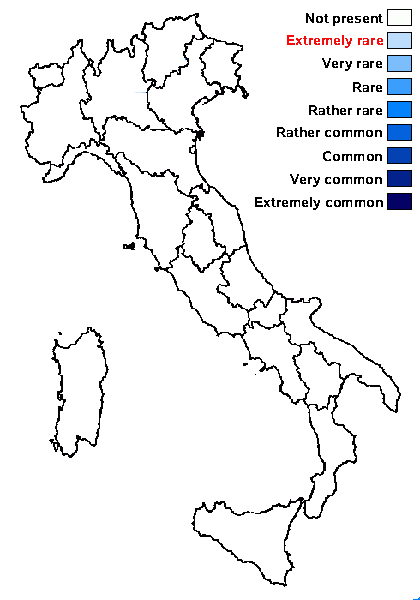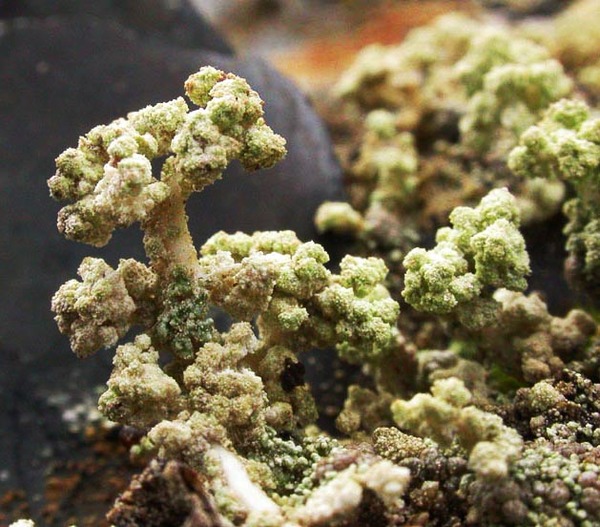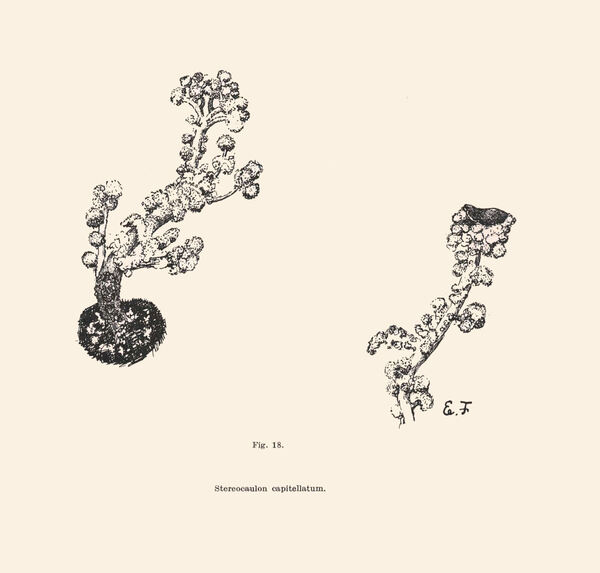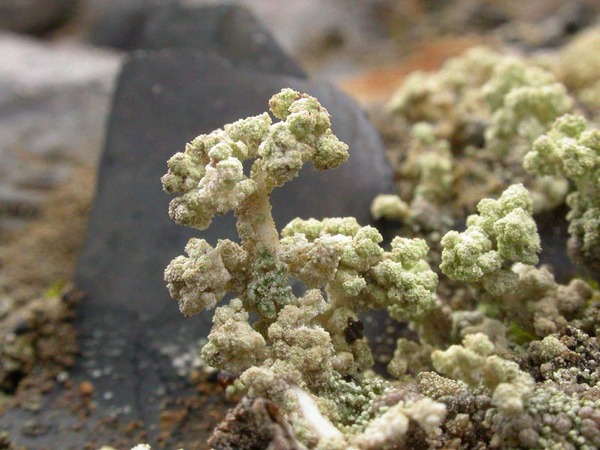Stereocaulon capitellatum H. Magn.
Göteborgs Kungl. Vetensk.-och Vitterh. Samh. handl., Ser. 4, 30, 7: 39, 1926.
Synonyms: Stereocaulon farinaceum H. Magn.
Distribution:
Description: Primary thallus crustose, ephemeral, usually absent in mature individuals, secondary thallus fruticose, forming 1-2 cm wide and 5-10(-11) mm high cushions. Pseudopodetia delicate, firmly attached to the ground, 0.3-0.6 mm thick at base, white with a pale pink tinge, abundantly branched in the upper parts, which bear well-delimited, capitate soralia. Central medullary layer compact, grey or dark yellow-brown; outer hyphae white, forming a 50-90 µm thick tomentum of thick-walled hyphae. Phyllocladia mainly on upper side of decumbent pseudopodetia, flattened-verruciform, glaucous white, confluent, corticate, the cortex 15-25 µm thick, dissolving into farinose soredia. Cephalodia inconspicuous, embedded in the tomentum, with Nostoc. Apothecia and pycnidia unknown. Main photobiont: chlorococcoid. Spot tests: central axis and phyllocladia K+ yellow, C-, KC-, P- or P+ faintly yellow. Chemistry: atranorin, miriquidic, perlatolic, and anziaic acids.Note: a rare arctic-alpine species found on stones and acidic soil; in the Alps only recorded from Switzerland, to be looked for in the Italian Alps.
Growth form: Fruticose
Substrata: rocks, soil, terricolous mosses, and plant debris
Photobiont: green algae other than Trentepohlia (primary); cyanobacteria, filamentous (e.g. Nostoc, Scytonema) (secundary, e.g. in cephalodia)
Reproductive strategy: mainly asexual, by soredia, or soredia-like structures (e.g. blastidia)
Commonnes-rarity: (info)
Alpine belt: absent
Subalpine belt: absent
Oromediterranean belt: absent
Montane belt: absent
Submediterranean belt: absent
Padanian area: absent
Humid submediterranean belt: absent
Humid mediterranean belt: absent
Dry mediterranean belt: absent

Predictive model

Einar Timdal. Source: http://www.nhm2.uio.no/botanisk/lav/Photo_Gallery/Stereocaulon/capitellatum_G=Norway+Finnmark+Alta_D=20030813_H=O-L123188_C=ET_I=2.jpg
Growth form: Fruticose
Substrata: rocks, soil, terricolous mosses, and plant debris
Photobiont: green algae other than Trentepohlia (primary); cyanobacteria, filamentous (e.g. Nostoc, Scytonema) (secundary, e.g. in cephalodia)
Reproductive strategy: mainly asexual, by soredia, or soredia-like structures (e.g. blastidia)
Commonnes-rarity: (info)
Alpine belt: absent
Subalpine belt: absent
Oromediterranean belt: absent
Montane belt: absent
Submediterranean belt: absent
Padanian area: absent
Humid submediterranean belt: absent
Humid mediterranean belt: absent
Dry mediterranean belt: absent

Predictive model

 INDEX FUNGORUM
INDEX FUNGORUM
 GBIF
GBIF



